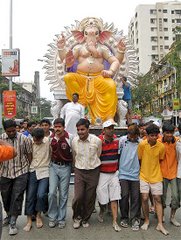ನನ್ನ ಮನಸ್ಸನ್ನು ಯಾವತ್ತೂ ಕಾಡುವ ಹಾಡಿದು.
ಸಂಗೀತ : ಮೈಸೂರು ಅನಂತಸ್ವಾಮಿ
ಸಾಹಿತ್ಯ : ಗೋಪಾಲ ಕೃಷ್ಣ ಅಡಿಗ
ಹಾಡುಗಾರರು: ರತ್ನಮಾಲಾ ಪ್ರಕಾಶ್
ಯಾವ ಮೋಹನ ಮುರಳಿ ಕರೆಯಿತು ದೂರ ತೀರಕೆ ನಿನ್ನನು
ಯಾವ ಬೃಂದಾವನವು ಸೆಳೆಯಿತು ನಿನ್ನ ಮಣ್ಣಿನ ಕಣ್ಣನು?
ಹೂವು ಹಾಸಿಗೆ ಚಂದ್ರ ಚಂದನ ಬಾಹುಬಂಧನ ಚುಂಬನ
ಬಯಕೆ ತೋಟದ ಬೇಲಿಯೊಳಗೆ ತರಣಗಣ ಧೀರಿಂಗಣ!
ಸಪ್ತಸಾಗರದಾಚೆಯೆಲ್ಲೋ ಸುಪ್ತಸಾಗರ ಕಾದಿದೆ
ಮೊರೆಯದಲೆಗಳ ಮೂಕ ಮರ್ಮರ ಇಂದು ಇಲ್ಲಿಗೂ ಹಾಯಿತೆ?
ವಿವಶವಾಯಿತು ಪ್ರಾಣ ಹಾ ಪರವಶವು ನಿನ್ನೀ ಚೇತನ
ಇರುವುದೆಲ್ಲವ ಬಿಟ್ಟು ಇರದುದರೆಡೆಗೆ ತುಡಿವುದೆ ಜೀವನ!
Subscribe to:
Post Comments (Atom)

1 comment:
Beautiful poem I was able to locate on the web. Some one asked me what the meaning at places is; and I had sent them this email that I will record here:
2. Music of the song and words are really arresting and can entice you to lsten again and again.
3. Context
From what I know this poem was composed by Adiga the poet, when he first heard a call from inside. His style and substance before was one of what is called in Kannada as "navya" which challenged the traditional style known in Kannada as "navOdaya" ( or 'romantic' in English). Other popular forms of poetry or literary styles in Kannada are 'bandaaya" and "dalita".
In other words a rebel poet turned inward (the first step in becoming 'romantic' or 'rasa-kavi'). Please do not confuse the romantic here with movies like QSQT(Juhi chawla and Amir Khan) although there is a connection.
4. ಸಪ್ತಸಾಗರದಾಚೆಯೆಲ್ಲೋ ಸುಪ್ತಸಾಗರ ಕಾದಿದೆ
ಮೊರೆಯದಲೆಗಳ ಮೂಕ ಮರ್ಮರ ಇಂದು ಇಲ್ಲಿಗೂ ಹಾಯಿತೆ?
Meaning now becomes 'The outwardly visible oceans may be huge when you are engaged in a materialistic world but there still awaits an inwardly ocean ( ಮೊರೆಯದಲೆಗಳ ==> 'ocean that does not roar" or oceans that are not visible because they are inside us 'aadhyaatmika saagara' ) and so the poet says the 'silent murmur' (ಮೂಕ ಮರ್ಮರ) flowed his way finally. He got a call from inside.
In summary the poet was very happy in the outer world which offered him enough matrerial like an ocean but something inside him revealed a much richer material finally.
5. As for ಯಾವ ಬೃಂದಾವನವು ಸೆಳೆಯಿತು ನಿನ್ನ ಮಣ್ಣಿನ ಕಣ್ಣನು? its is the same thing.
His eyes were rooted in the 'tangible and visible' (earth - ಮಣ್ಣಿನ) but were drawn towards the 'romantic', 'imaginary' and 'divine' (ಬೃಂದಾವನವು).
Post a Comment